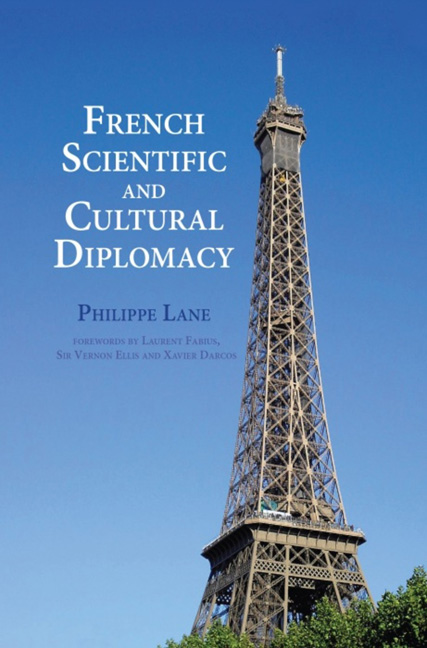Book contents
- Frontmatter
- Contents
- List of Tables
- List of Abbreviations
- Acknowledgements
- Foreword
- Foreword
- Foreword
- Introduction
- 1 French Foreign Cultural Activities: A Tradition with a Long History
- 2 Cultural and Scientific Action since 1995: Soft Power or Hard Power?
- 3 The Protagonists of Cultural and Scientific Diplomacy; 2011: A New Start
- 4 Cultural Diplomacy and the Arts
- 5 Science and University Diplomacy
- 6 Linguistic and Educational Cooperation
- 7 The Organization and Implementation of French Cultural and Scientific Activities Abroad
- Conclusion
- Index
Foreword
- Frontmatter
- Contents
- List of Tables
- List of Abbreviations
- Acknowledgements
- Foreword
- Foreword
- Foreword
- Introduction
- 1 French Foreign Cultural Activities: A Tradition with a Long History
- 2 Cultural and Scientific Action since 1995: Soft Power or Hard Power?
- 3 The Protagonists of Cultural and Scientific Diplomacy; 2011: A New Start
- 4 Cultural Diplomacy and the Arts
- 5 Science and University Diplomacy
- 6 Linguistic and Educational Cooperation
- 7 The Organization and Implementation of French Cultural and Scientific Activities Abroad
- Conclusion
- Index
Summary
France as a power has influence, one of the few countries significant in world affairs. This derives from membership of the Security Council, economic and military strength, a diplomatic network, avowed universal principles, a willingness to argue beyond the country's own interests, and the language. Philippe Lane's book explores critical components of this influence in culture, the arts, academia and science.
This influence has global competition. All countries, both established and emerging powers, appreciate the strategic nature of culture, science and education for their development. From an economic perspective, these elements have their attraction: politically, they are means to exert influence.
In a competitive world, France is determined to promote its strengths. There is a readiness to build on French history, on research which is among the most innovative in the world, on the university system, and on French artists. There exists a network of influence: cultural, educational, scientific and academic cooperation unsurpassed in the world: the legacy of a long tradition of cultural and scientific outreach beyond the borders of France. The strategy is one of active influence through cooperation and cultural initiatives by embassies and by branches of the Institut Français and the Alliances Françaises.
As visiting professor in the Department of French Studies at the University of Cambridge and attaché for higher education at the French embassy in London, Philippe Lane has a thorough understanding of the diplomacy of influence. From his experience within this network, he describes French initiatives in the fields of cultural diplomacy and science. The work shows, and this is particularly striking to me personally, that this diplomacy of influence is inseparable from the advancement of empowerment, justice and progress long championed by France.
- Type
- Chapter
- Information
- French Scientific and Cultural Diplomacy , pp. xi - xiiPublisher: Liverpool University PressPrint publication year: 2013

